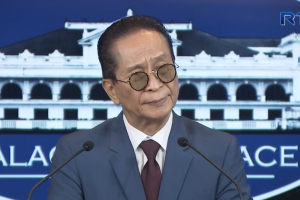By Azer Parrocha/PNA
 MANILA — President Rodrigo Duterte will weigh the social costs of pushing through with the implementation of the second tranche of the oil excise tax increase scheduled for 2019, Malacañang said Friday.
MANILA — President Rodrigo Duterte will weigh the social costs of pushing through with the implementation of the second tranche of the oil excise tax increase scheduled for 2019, Malacañang said Friday.
However, the President will also consider what is stipulated under the Tax Reform for Acceleration and Inclusion (TRAIN) law, Presidential Spokesperson Salvador Panelo said in a press statement.
“We note the sentiments of the Filipino consumers and the President will certainly weigh in the social costs involved,” Panelo said.
“Due regard, however, must also be given to the dictates stipulated under the law, which only the Congress can modify,” he added.
Panelo made the remark after the Development Budget Coordination Committee (DBCC) publicly announced that it would recommend the continued implementation of the oil excise tax’s second tranche.
He said the DBCC recommendation is still subject to discussion in the next Cabinet meeting on December 4.
The Palace official, meanwhile, advised the public to wait for the President’s decision, noting that national interest will always be put into consideration.
“The President’s decision will, as always, be based on national interest and benefit to the people,” Panelo said.
The DBCC’s recent recommendation is a complete reversal from their recommendation earlier this year, when oil prices soared to more than USD80 per barrel, that the hike be put on hold until world crude prices have softened.
Since then, oil prices have rapidly retreated to less than USD70 per barrel.
Under the TRAIN law, the oil excise tax hike may be suspended if oil prices in the world market averaged USD80 per barrel in the last three months of 2018.
Finance Secretary Carlos Dominguez III said economic managers want to implement the PHP2 per liter hike on oil prices next year because conditions in the world market have changed abruptly since their last recommendation.
Dominguez said that there are also projections that the price of oil will decline further to less than USD60 per barrel in 2019.
